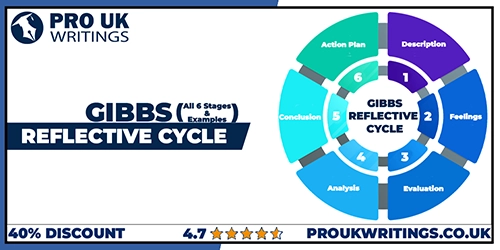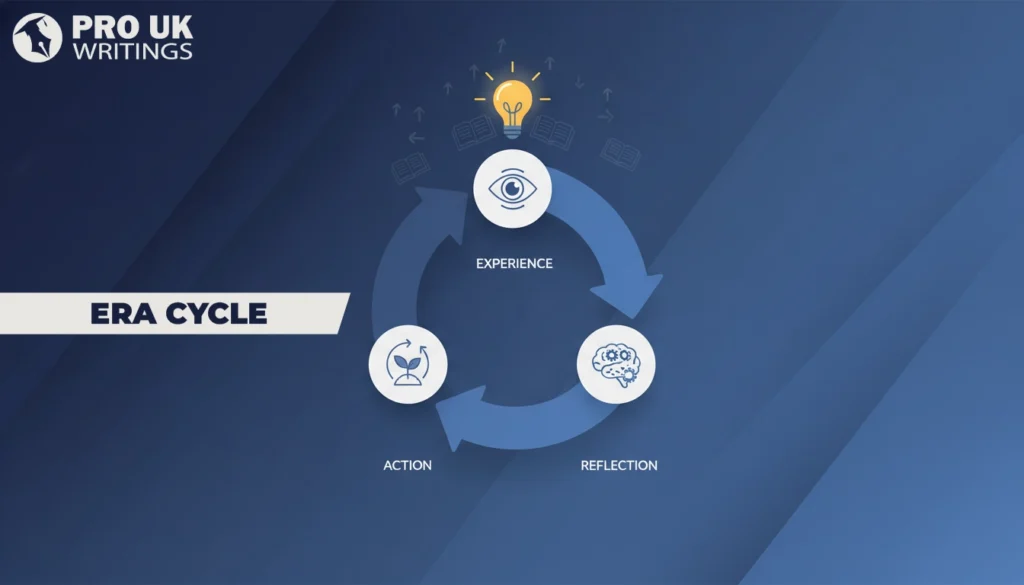GIBBS REFLECTIVE CYCLE
The Gibbs Reflective Cycle is a structured model for reflection past experiences commonly used by individuals, particularly in the fields of education, healthcare, and professional development. It was developed by Graham Gibbs, and it consists of six stages that guide individuals through the process of reflecting on an experience.
WHAT IS GIBBS REFLECTIVE CYCLE? LET’S UNDERSTAND IT BETTER
Gibbs model of reflection is a cycle of human experiences that helps people comprehend their actions in order to burgeon their stature. Gibbs’ reflective model endeavor to cultivate systematic thinking in people, allowing them to stretch out well-founded conclusions and upgrade their decision-making competencies.
The Gibbs reflective cycle is a popular model for reflection, that allows individuals to scrupulously contemplate their past actions systematically. Gibbs reflection of cycle has prevalently been used and has also been accepted as “THE MODEL OF REFLECTION”. Prospered by Graham Gibbs in 1988 at Oxford Polytechnic, this reflective cycle framework is widely used within various fields such as education, healthcare and management to flourish professional and personal development.
This reflection cycle encourages individuals to consider their own experiences in a more in-depth and analytical way, helping them to identify how they can do better for the good in the future.
Midwifery came to conclusion that about 63% of qualified healthcare experts use Gibbs model of reflection like clockwork, many students find themselves facing hard time when being given topics to write about this, but Pro UK Writings has got it all covered with our team of exceptional writers, you will face no problem.
HOW GIBBS REFLECTIVE CYCLE EMANATED?
Professor Graham Gibbs, an advocate of “experiential learning,” emanated his model in the 1988 publication, “Learning by Doing.” This groundbreaking work at the time inclined the attention of leading psychologists. Gibbs’ reflective cycle was noted to be an effective method for contemplating the past, aiding people to have a record of challenging situations with composure and resilience.
Over the course period of time, it altered into a pivotal instructional approach, aiding learners in comprehending and analyzing their experiences. In today’s modern era of education, in a peculiar manner nursing students who might need help with their nursing assignments, using the Gibbs model to straighten out the complex cases that are relevant to patient’s health.
Accepting the realities that went fiasco as valuable life lessons, students grasp this reflective tool to analyze their mistakes in order to obtain a proactive mindset. As the field of nursing focuses towards the service delivery and individual’s well-being, students frequently dive into nursing assignments, meticulously trying to get the insight of the Gibbs model application.
For students who are in dire need of well-crafted paper, often turn to professional services like Pro UK Writings nursing assignment help for the top-notch quality work.
6 STAGES OF GIBBS REFLECTIVE CYCLE
Here you can read in-detail about, the 6 stages of GIBBS Reflective Cycle so you can understand this better.
Initial Stage “Description”
In the very initial phase, you will be asked to explain your feelings regarding the incident that had betided. To set the stage for analysis and great attention to details of the past event. This step of the Cycle functions to give out concise, accurate information for better understanding.
Second Stage “Feelings”
The second stage, “Feelings,” is the reflective process, that goes through the emotional dimensions of the experience. Participants are motivated to explore their own feelings as well as the emotions of other individuals. This stage adds a layer of in-depth understand to the reflection, to be cognizant of the personal side of the experience to encourage compassion and empathy.
Third Stage “Evaluation”
“Evaluation” is the third stage in this process, individuals are encouraged to carefully evaluate their experience and are petitioned to analyze both positive and negative aspects, identifying what worked impressively and what could have been done better. This evaluative step contributes to a nuanced understanding of the situation, permitting individuals to recognize patterns and outcomes.
Fourth Stage “Analysis”
“Analysis”, the fourth stage, individuals get asked to analyze experience by breaking it into parts. This involves exploring the factors due to which the incident had happened. By scrutinizing different elements at play, people obtain insights into the hidden pieces of the puzzle, contributing to a more meaningful understanding of actions and decisions they had made.
Fifth Stage “Conclusion”
Fifth stage of the cycle “conclusion.” Summarizes reflections for clarity. Here, individuals purge through the key lessons ascertained from their experiences, acknowledging new insights gained. This step clears the way for perception of closure and capture the reflective journey, offering a foundation for future growth and development.
Sixth Stage “Action Plan”
The final stage of the cycle “Action Plan.” In this step individuals are encouraged to execute their new principles and morals which they have come in terms with by going through the 5 steps mentioned above. This forward-looking aspect of the model amalgamates the new knowledge into future scenarios which contributes into perpetuating the cycle of learning and improvement.
PROS AND CONS OF GIBBS REFLECTIVE CYCLE
Here you can read through the advantages of Gibbs reflective cycle and disadvantages of Gibbs reflective cycle to understand better:
PROS OF GIBBS REFLECTIVE CYCLE
- Provides an evident framework systematically for reflection.
- It encourages individuals to critically observe their experiences.
- This process can be implemented in diverse fields.
- Helps understand the emotions, thoughts, and actions for reflective comprehension.
- Helps individuals to learn and grow for better in the process.
CONS OF GIBBS REFLECTIVE CYCLE
- The detailed structure can be overwhelming for some individuals because of the complex structure.
- If some individuals prefer more flexible modal, then this can be rigid for them.
- It can be majorly time consuming.
- It can be subjective as stages vary.
- Can heavily be emphasized on feelings apart from other aspect.
HOW TO USE GIBBS REFLECTIVE CYCLE?
There are various ways through which Gibbs 1988 reflective cycle can be used professionally or for personal contexts.
How Gibbs reflective cycle can be utilized?
In order for you to implement the Gibbs cycle in your professional nursing help of fostering individuals or for your personal context you have to make sure the spiritual sensation of honesty and openness is present within your or your patient’s self. Be candid about your thoughts and feelings, even if they might be uncomfortable.
This honesty is essential for genuine self-reflection. Try to look upon the situation from multiple different perspective including your overview and along with trying to see the same situation from a perspective of another individual.
To add in-depth understanding of the betided incident you should make your experiences relevant to the theory which will lead you to formulate realistic ambitions for the final step of “Action Plan” stage which will help you to come up with thinking of executing plans and aiming for actions that are accessible along the lines of tangibility improvements.

Sebastian James
Blog Author
Meet Mister Sebastian James who is an accomplished academic writer, who holds great credentials in various different faculties of academic writing having the degree of doctorates. Mr. Sebastian James is the original author all of the content written on this website with great knowledge of academics Mr. Sebastian James is the original upfront writer for Pro UK Writings.
FAQs
Find Solutions of your queries
By assessing their mistakes and failures from the past experiences it helps individuals to make better decisions by recognizing the negative outcomes that one had to endure by not making the decisions.
By reflecting upon the past communications individual can easily determine the things went wrong and can effectively make improvements in the present for better communication skills.
In the Gibbs reflective cycle, the analysis stage I the stage of breaking the parts of past experiences into fragments in order to explore multi perspective of the same situation.
Gibbs reflective cycle plays a significant role in giving an individual the sense of their own individuality by crucially examining their entire personality including their actions, thoughts and experience they dealt with.
Gibbs reflective cycle is a 6-stage process scrupulously encouraging one individual to scrutinize their mistakes, failures and mediocre experiences.
Having an overlook of your personal relationship reflecting upon the confliction, debates and dissimilarities Gibbs reflective cycle aid individuals to enhance their communication skills and refrain them from taking impulsive decisions.






